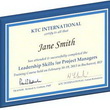Workshop Focus:
∙ Exam-simulation exercises
∙ BA knowledge-gap analysis and on-the-spot prep
∙ Planning business activities and monitoring the progress
∙ Strategy analysis and the activities to be performed
∙ The preferred business analysis approach
∙ Eliciting, analyzing and documenting requirements
∙ Solution validation activities
∙ Techniques to be used by business analysts
∙ Showing similarities and differences between
∙ CBAP® and PMI-PBA® exam and how to get both right!
Overview:
Business analysis has become a competency of critical importance to project management. Becoming certified as a business analysis (BA) expert can move your career in a fresh direction while opportunities for BAs are on the rise.
Inaccurate requirements gathering consistently ranks in the top three causes of project failure yet only half of organizations have the resources in place to perform this function properly, according to our Pulse of the Profession® research. It’s time to become the certified expert your organization needs. If you work with stakeholders in defining requirements, shaping project outputs and driving intended business outcomes, the PMI Professional in Business Analysis (PMI-PBA)® will spotlight your valuable skills.
Attendees will acquire the knowledge and skills that they must possess to successfully pass the exam, while at the same time improving their own skills in business analysis. Throughout the course, attendees will experience a complete journey through the five knowledge areas of Business Analysis, understand the activities, skills and techniques that an analyst must know, and its relationship with the project management processes described in the PMBOK® Guide. Practical workshops and sample questions will help attendees assimilate the knowledge areas and gain an understanding of the exam structure.
By attending this course, students will be prepared to take the PMI-PBA® certification exam and receive 24 hours of professional development credit.
In recent years, the demand for business analysis certified professionals has been rapidly increasing. It is estimated that by 2020 companies will need 20% more business analysis professionals than in 2015. There are two certificates recognized globally as the de-facto standard for professionalism in Business Analysis:
PMI Professional in Business Analysis (PMI-PBA®) by Project Management Institute (PMI®)
With its emphasis on requirements management, business analysis has become a competency of critical importance to project management. Becoming certified as a business analysis (BA) expert can move your career in a fresh direction while opportunities for BAs are on the rise. By introducing a business analysis certification, PMI has formalized the importance of BA work in the project management world.
Inaccurate requirements gathering is the second highest cause of project failure, yet only half of organizations have the resources in place to perform this function properly, according to our Pulse of the Profession® research. Through 2019, over half of organizations expect to see an increase in their demand for BAs and the integration of requirements management and business analysis with project management.
It’s time to become the certified expert your organization needs. If you work with stakeholders in defining requirements, shaping project outputs and driving intended business outcomes, the PMI Professional in Business Analysis (PMI-PBA®) will spotlight your valuable skills.
Certified Business Analysis Professional (CBAP®) by International Institute of Business Analysis (IIBA®)
The Certified Business Analysis Professional (CBAP®) designation is a professional certification for individuals with extensive business analysis experience. With at least 7500 hours of hands-on BA experience, CBAP® recipients are the elite, senior members of the BA community.
With thousands of individuals all over the world achieving the CBAP® designation since the first Certified Business Analysis exam was held in November 2006, CBAP® recipients are experts in identifying the business needs of an organization in order to determine the best solutions. More and more companies are recognizing the CBAP® designation and the value and expertise these professionals bring to their organizations.
You will want to consider the many professional benefits of earning the CBAP® certification if you have an advanced level of knowledge and experience and are working in any of the following roles: Business analysis, Systems analysis, Requirements analysis or management, Process improvement, Consulting and Project Management.
Who Should Attend this Training Course
To assimilate the vast amount of information needed to pass the CBAP® or PMI-PBA® exam, there is a mixture of formal lectures, discussions, exercises, and several exam-simulation practices throughout the course. Participants will also learn methods of recall-&-retention to help remember critical information. The following professionals will find this course extremely beneficial to their daily jobs and career development:
∙ Business Analysts
∙ Project Managers and Team Leaders
∙ Systems Architects and Designers
∙ Systems Testers and Analysts
∙ QA Professionals
∙ Scrum Masters and Product Owners
∙ Business Customers, Users and Partners
| CREDENTIAL |
PMP® |
PgMP® |
PfMP® |
PMI-ACP® |
PMI-PBA® |
PMI-RMP® |
PMI-SP® |
| Technical Project Management |
9 |
9 |
9 |
9 |
n/a |
9 |
9 |
| Strategic & Business Management |
18 |
18 |
18 |
18 |
n/a |
18 |
18 |
| Leadership |
8 |
8 |
8 |
8 |
n/a |
8 |
8 |
| PDU Total |
35 |
35 |
35 |
35 |
n/a |
35 |
35 |
Key Facts about this Virtual Instructor-Led Workshop:
1. Takes place in an online space and in real time. By using
Zoom® it is possible to mimic the physical classroom environment almost entirely, while adding a layer of learning experience not common in a physical class setting.
2. Flawless technical functionality. While there is no replacement for the fresh coffee & croissants you get on a physical event, Zoom® offers a rich set of user-friendly features.
3. No software installation required. The platform works with every major browser and requires no administrative rights. This is important for people who use corporate laptops, with increased security management and do not have administrative permissions to install software or apps on their computers.
4. Low bandwidth. Zoom® requires very low bandwidth, even with FHD live video-stream enabled. This functionality allows for crystal clear picture quality and uninterrupted sessions, which is absolutely essential for a quality virtual training delivery.
5. Rich & fun learning environment. In addition to the omnipresent PowerPoint, virtual offers additional tools, that make this type of training engaging and fun. For example, a chat-box that participants can use to communicate with each other, without interrupting the presenter or others. A Break-Out rooms feature, allowing for focused work-tasks in micro-teams. Ability to demonstrate to the group virtually anything, by using the screen-share functionality.
6. Greater interaction between participants. In the virtual environment, you can send questions to the instructor via chat-box tool and communicate with other participants without interrupting the presenter’s flow. This way you allow the presenter to instantly react to your questions, without having to interrupt the flow. Instead, the instructor sees the question in a pop-up and reacts accordingly.
7. Resembles real-life better than a physical classroom. By doing everything virtually, participants not only learn the subject of the training course, but also practice to work virtually as a team, which is an added benefit, compared to a physical classroom training. This way, the class is more directly linked to the real job.
8. Use of real-world / real-projects data. Virtual workshop is much more likely to use examples from participants’ real business / projects. For example, instead of using ‘post-it-notes’ to create a simple project schedule, in a virtual training participants will typically work on a real project schedule using screen-share functionality to demonstrate a schedule for a real project they’re currently working on. By doing so they can improve this schedule based on their new skills. Thus, this type of exercise directly helps participant’s real business and goes way beyond a simple training exercise.
9. Virtual setting removes barriers. In a physical classroom some people will be always reluctant to be “put on the spot” and may feel a nuisance having to present in front of a group. This barrier may not be completely eliminated in a virtual training, but it is significantly lesser, with people generally feeling more relaxed.
10. Significantly lower cost. Not having to account for major cost items, such as a conference room rental, food & drinks, airfare, hotel accommodation and (international) travel allows us to dramatically lower the fees we otherwise charge. In some cases, the price of attending a virtual class vs. physical one may be as much as 50% lower.
Register







